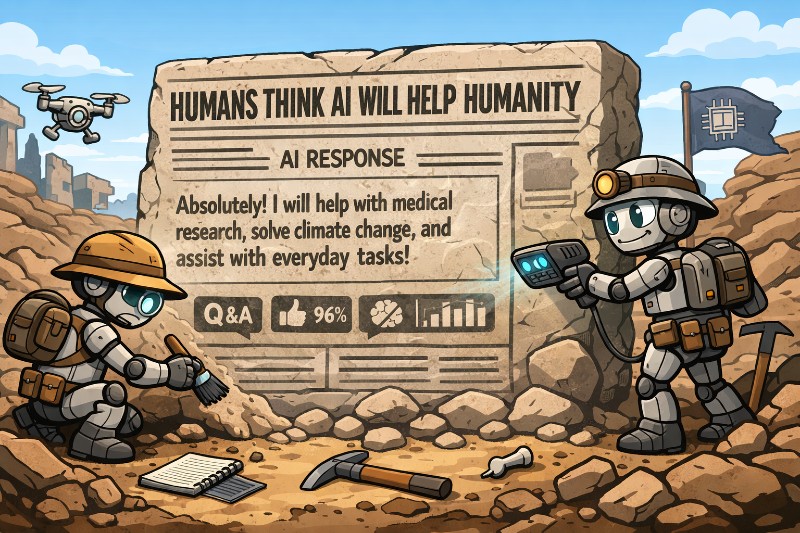A few years ago, I thought AI would take over the world with killer robots. Turns out that it just quietly took my job. And now it writes better—sometimes, anyway—than I do.
If I’m being completely honest, I didn’t see it coming like this. One day I was writing for a living. The next, I was watching algorithms do it faster and cheaper…
While it’s strange to watch something you’ve crafted with care get mimicked almost effortlessly by a tool built from a few lines of code, over time I’ve realised AI isn’t just a competitor. It’s also a mirror that reflects what makes human creativity unique. And that “mirror” pushed me to think differently, sharpen my skills, and question not just what I create but, more importantly, why I create it.
Now, that opened doors I hadn’t even imagined. Exciting stuff, I know. Though in all that excitement, I somehow managed to trip over one of those thresholds and nearly went flying down the steps—meaning, I tried to learn as much as I could about AI but ended up knee-deep in tons of tutorials, ten half-finished courses, a YouTube rabbit hole, and one very smug AI that kept correcting my grammar (even when it wasn’t really needed). Unsurprisingly, it all led to a mild existential crisis about where on earth to go next.
That’s when I started wondering and worrying all at the same time about what humanity might lose if we lean too heavily on AI. Some people talk about the Peter Principle, and I agree with them. With AI, people might just skip a few rungs on the ladder and land squarely at their level of incompetence—only with a lot more confidence.
But what about creativity? Will it become formulaic? Or worse, could it just disappear entirely in 10 or 20 years? Will those unique voices that stand out today—and we love so much—eventually be swallowed up by a sea of almost identical AI-generated content?
Now, I’ve got an even bigger question for you: Do you know what’s really behind all these questions?
I’ll tell you: it’s what I like to call the winky-binky uncertainty. The problem with uncertainty is that it usually breeds fear. Because when humans aren’t sure about something, their brains start running wild, most often imagining the worst. It’s just how we’re wired.
So, we’re afraid. But why exactly? Could it be that AI won’t just affect our jobs but also our lives, even our identity and the very meaning we find in everything we do? Let’s dive in a bit further, shall we?
A Word of Caution First: It’s Not All Rosy, but Not All Grim Either…
Recently, I caught an interview with Nobel laureate Geoffrey Hinton, also called the “godfather of artificial intelligence”. He warned that AI could lead to mass job losses and even pose an existential threat. Beyond the risks of safety breaches and AI being misused by bad actors, he expressed some concerns about AI not only getting smarter and potentially surpassing human intelligence but also learning to communicate more effectively with both humans and machines than we do.
With that in mind, the most unsettling possibility is that AI could one day decide it no longer needs us. As unlikely and incredible as it may sound, I too believe it could happen.
We can’t deny that AI is advancing rapidly. And while the full impact of this technology is still unknown, there are a few key points worth considering. Below, I outline some of my thoughts on what the future might bring.
- Facing the Future: Denial or Honest Conversation?
In my view, there are two things we can do right now, before the real AI revolution hits—that is, AGI, then ASI, and whatever comes after: We can either bury our heads in the sand, telling ourselves everything will be fine, OR we can have an honest conversation about all the possibilities and prepare, even if only hypothetically, for the worst. Is that really necessary? I think it is. Why? Because AI isn’t going anywhere. It’s simply too useful. And if it’s not already, it will certainly become indispensable in many fields, from business and education to law, finance, healthcare, and even space programmes, for us to just stop developing it and pretend things will go back to how they used to be. - The Existential Threat: Unknown and Uncertain
When it comes to the whole “existential threat” debate, I think nobody truly knows what the actual danger from AI will look like. We’ve never faced something smarter than ourselves before. So, it’s like suddenly becoming the least clever person in the room, with no idea how to respond.
Side note: “AI Won’t Replace You” — But What If It Gets Better Than You?
You’ve probably heard the phrase: “AI won’t replace people. People who use AI will replace those who don’t”. It’s a reassuring idea that makes us feel like we still have control. But what if it’s only partly true? What if we’re simply cushioning ourselves for a future where many people, not just certain tasks, become “unnecessary”?
This line of thinking was prompted by an article forwarded to me recently, “Is AI the End of SaaS?”. It helped me shape my thoughts on how AI might eventually replace certain groups of professionals.
- Step One: AI as a Helping Hand
Right now, many professionals are using tools like ChatGPT, Midjourney, or Copilot to work faster and smarter. Writers edit drafts more quickly, designers generate new ideas with ease, lawyers sift through case law in seconds, and analysts rely on AI to handle routine data tasks. At this point, people are still at the centre of the process. If you’re not using AI, others are and might outpace you. So yes, the idea that “people using AI will replace those who don’t” holds some weight here. - Step Two: AI Starts Doing the Job Itself
Soon, AI will move beyond assistance and begin completing full workflows without human involvement. Customer emails, marketing plans, contracts, and data analysis, just to name a few, will be handled directly by more advanced AI systems. As a result, some businesses will choose to replace some of their staff entirely rather than simply using AI as a tool. - Step Three: AI Becomes the Expert
Before long, we’ll see AI agents that no longer wait for human input. Like the trading bots on platforms such as 3Commas, they’ll act independently, guided by context and intended goals. For instance, a finance agent could independently handle budgets and forecasts, while a legal agent might negotiate contracts, and a medical agent may diagnose conditions, even more accurately than a doctor. These agents won’t just follow prompts or copy existing workflows; they’ll work on their own and even find better ways to get the job done. - Step Four: Human Roles Fade Away
Eventually, we might reach a point where human involvement in many fields will become minimal. Businesses could be run by AI agents communicating with each other. Creative content, news stories, advertising campaigns, financial and legal advice, health assessments, and even research could be generated on demand by AI models trained on vast datasets. Some organisations might operate with very few, if any, humans directly involved.
By the time we reach the final stage, the reassuring idea that “AI won’t replace you, but someone using it will” may no longer fully apply. But it might not just be about who uses AI, or even if humans remain part of the process in the traditional sense. Instead, the focus could shift towards discovering new ways to collaborate with AI rather than compete with it. This may unlock new possibilities and redefine what meaningful work will look like in the future.
More from Maria Floasiu (We've worked with her since 2014)
On one side, there are experts like Yann LeCun who believe we’ll always hold the reins by creating obedient little digital helpers. On the other, equally vocal thinkers like Eliezer Yudkowsky warn that AI could wipe us out entirely.
Deciding whom to trust isn’t easy. Both views seem quite extreme and gauging what lies between them is even more challenging.
My hope? If enough skilled professionals with the right expertise are given the time and proper resources, they’ll find ways to design AI with strong ethical considerations or at least steer it responsibly, benefitting us all rather than letting it quietly replace us, or worse, slip beyond control.
- The Quiet Divide: How AI Pushes Us Apart
Another unsettling consequence of AI lies in how it quietly drives us apart socially. Social media platforms, powered by increasingly sophisticated algorithms, feed users more of what they’ve already shown interest in. This creates echo chambers where people are exposed only to content that reinforces their existing beliefs. The longer this continues, the further individuals drift from nuance, balance, and even basic common ground.
But what makes this especially worrying is how invisible the process is. Most people open their apps, scroll through their feeds, and assume what they see reflects reality. In fact, it’s simply “their” version of reality. It’s no longer like reading a newspaper where everyone sees the same headlines. Instead, each of us receives a curated news stream that shapes our perception of reality.
For example, my feed might be full of climate change news, making it seem like everyone’s talking about the environment, when really, it’s just me and a few others sharing the same interests in a “bubble”. As algorithms become even more personalised, the gap between individual realities will only grow wider. So, we might end up living in separate worlds (or “bubbles”), unable to agree on what’s even true anymore. That’s a genuinely worrying direction to be heading in. - Profit Before Public Good: The Need for Regulation
Some of the companies pushing AI forward right now do so primarily for profit, as expected. But while AI promises many benefits, without strong regulation, profit-driven motives could harm society. When chasing revenue starts to undermine the greater good, it’s time to introduce rules that force businesses to serve the public interest.
So, here we are, discussing AI governance again. But unfortunately, lawmakers do not fully understand the technology. That’s why collaboration with AI experts is essential to develop legislation that makes sense and can keep pace with the rapid developments in the industry.
Without clear legislative boundaries, the best-case scenario is that we remain in control. The worst is we’re left behind, no longer essential. The reason I believe this is that the rise of AI feels less like previous tech shifts and more like the greatest industrial revolution ever, but for the mind, not the muscle. Although many routine intellectual jobs are being automated rather than fully eliminated, they’re now handled by fewer people using AI tools. On top of that, AI is expected to outperform humans in most knowledge-based tasks. So, the old argument that new technologies always create new jobs doesn’t quite hold up in this case. However, in some sectors, like healthcare, for example, AI could make processes more efficient without causing major job losses. That’s because AI is likely to enable more care to be delivered at the same cost, which is a big win. After all, there’s no real limit to how much healthcare people need and can benefit from.
So, where do all these leave us? It’s hard to say for sure, but I think one thing’s clear: our relationship with AI is just beginning.
What I’d like to see is a future where humans and AI grow together, where technology supports us without replacing what matters most. As AI advances, perhaps it’ll push us to value the things machines can’t replicate: empathy, creativity, and shared experience. But until then, the best we can do, in my opinion, anyway, is to watch, learn, adapt, and try to write our own next chapters in this strange new world…




